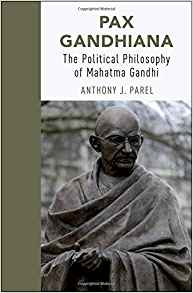Pax Gandhiana: The Political Philosophy of Mahatma Gandhi
TRANSCEND MEMBERS, NONVIOLENCE, REVIEWS, LITERATURE, 25 Nov 2019
Howard Richards – TRANSCEND Media Service
Pax Gandhiana: The Political Philosophy of Mahatma Gandhi, by Anthony J. Parel, Oxford University Press, Aug 2016
 In a world where mainstream studies of peace and politics are dominated by what passes for realism and what passes for world order, the distinguished Gandhi scholar Anthony Parel has derived from a close study of Gandhi’s works a political philosophy that promises in the long run to be more realistic than the so-called realists. It rests on a deeper order, an order in the human soul, than the global political and economic order established after World War II whose current disintegration mainstream scholars are now lamenting.
In a world where mainstream studies of peace and politics are dominated by what passes for realism and what passes for world order, the distinguished Gandhi scholar Anthony Parel has derived from a close study of Gandhi’s works a political philosophy that promises in the long run to be more realistic than the so-called realists. It rests on a deeper order, an order in the human soul, than the global political and economic order established after World War II whose current disintegration mainstream scholars are now lamenting.
Fareed Zakaria has in recent years written a series of elegant polemics against ‘illiberal democracy,’ updating in many ways the older arguments of the classics of liberalism and of Karl Popper that if we desire, as most of us do and all of us should, civilized human relations, we must steer clear of what Popper called ‘tribalism’ and von Hayek called ‘fatal arrogance.’ We must avoid mixing true liberal capitalism with socialism, populism, religion, economic nationalism, personality cults, and/or ethnic identity.
There have been any number of works on one or another ‘crisis of governability.’ Most of them hold, for example Norberto Bobbio’s The Future of Democracy, that if democracy is to survive it must limit its ambitions to what can be accomplished within the framework of the currently dominant basic cultural structure. The World Economic Forum recently concluded its 2019 annual meeting announcing a series of initiatives under the heading ‘Globalization 4.0: Shaping a Global Architecture in the Age of the Fourth Industrial Revolution.’
Although all of the above can be mined searching for points of light pointing toward necessary fundamental cultural change, on the whole they mostly remain in a broad sense within the confines of what Anthony Parel, in an earlier work defined as ‘the Machiavellian cosmos.’ This earlier work was not just a scholarly study of Niccolò Machiavelli (1469-1527). It traced the hegemony of themes typical of that thinker in modern life. As such, it provides a foil for his studies of the very different cosmos in which Mahatma Gandhi lived and moved and had his being.
Even human rights, which are commonly construed as the antithesis of Machiavellian thinking, can be read in more than one way. We would suggest that one of them is Machiavellian in Parel’s sense. The 1948 Universal Declaration of Human Rights can be read as the normative basis of the Post World War II global order that promised social democracy but could not deliver it. Instead, that promise transmuted itself into neoliberalism.
In its present form the post-world war II global order is now challenged by massive social conflicts almost everywhere – obviously but not exclusively in Algeria, Bolivia, Brazil, Chile, China, Colombia, Ecuador, Egypt, France, Guinea, Haiti, Honduras, India, Iraq, Lebanon, Mozambique, Nigeria, Russia, South Africa, Sri Lanka, Syria, the United States, Venezuela, and Yemen.
In today’s context, human rights can also be read as primarily and fundamentally the four first-generation rights of 1789 (liberty, property, security, and the right to revolt); while the social rights of 1948 are read juridically as merely aspirations, and read politically, again echoing a consensus of scholars including Bobbio, as unrealizable. This second reading of human rights, so prominent in our challenging times when the very survival of humanity and the biosphere requires fundamental change, fits the pattern of what Parel calls the Machiavellian Cosmos as we understand it.
Parel’s writings on Gandhi, including Pax Gandhiana, are clearly intended to offer an alternative to humanity’s current impasse. Parel clearly takes his stand, as a Gandhi scholar, in another cosmos, another way of reading reality and of reading what it means to be human, calling for a new civilization with ancient roots. Key terms of its discourse are dharma, artha, kama and moksha. (Simplifying: virtue, order, shared prosperity, spiritual transcendence). As Gandhiji once said, clearly separating his views from the dominant ones now failing us, ahimsa’s first premise is seeing every person, not just as an abstract idea but as a passionate conviction, as a soul.
Pax Gandhiana is about the Gita teaching of renunciation of the fruit of one’s actions, while immersing oneself in politics and economics. It is about swaraj and swadeshi. Simplifying again: One key kind of swaraj, spiritual swaraj means freeing oneself from internal bondage through spiritual self-discipline. Swadeshi is local self-reliance.
Gandhi reframed and subordinated the prevalent profit motive of economics and employed benevolence and social affection as fuel to increase the economic growth of a nation. According to him, the wealth of a nation consisted more in persons who enjoyed a good quality of life both materially and ethically than in possession of goods. He never considered the right to private property as absolute. Practically, property was subject to the condition of meeting legitimate needs of the political community in which one lived. Regarding the use of one/s property, Gandhi proposed his well-known theory of trusteeship, a theory that (consciously or not) echoed Christian doctrines of stewardship and servanthood.
Parel does not argue that Gandhi’s path is the one and only path to peace. Pax Gandhiana should be read as articulating, speaking from a Gandhian tradition, the same sort of down to earth ethical message that Pope Francis articulates so eloquently speaking from a Christian tradition. Many others articulate similar messages of salvation speaking from many other traditions.
Neither does Parel represent Gandhi as infallible. Gandhi himself described his life as a series of experiments with truth. But every experiment runs the risk that the hypothesis it is testing is false, and indeed, Gandhi frequently changed his mind (see, for example, the third page of Chapter 5 of Pax Gandhiana)
Gandhi also described himself as a servant and his life as a series of opportunities for service. But every would-be servant of humanity (or would-be Samaritan serving one particular person in need) runs the risk of doing harm intending to do good. In this respect every conscientious human being, speaking and acting from any tradition whatever, or from no tradition at all, is fallible.
In tracing the development of his political philosophy, Pax Gandhiana portrays Gandhi as an exemplar of a human being persistently trying (and sometimes failing and learning from failure) to do the right as God (or ‘Truth”) gave him the light to see the right.
____________________________________________
Anthony J. Parel is emeritus professor of political science at the University of Calgary.
 Prof. Howard Richards now teaches at the University of Santiago and the University of Cape Town. He is a member of the TRANSCEND Network for Peace Development Environment. He was born in Pasadena, California but since 1966 has lived in Chile when not teaching in other places. Professor of Peace and Global Studies Emeritus, Earlham College, a school in Richmond Indiana affiliated with the Society of Friends (Quakers) known for its peace and social justice commitments. J.D. Stanford Law School, MA and PhD in Philosophy from UC Santa Barbara, Advanced Certificate in Education-Oxford, PhD in Educational Planning from University of Toronto. Books: Dilemmas of Social Democracies with Joanna Swanger, Gandhi and the Future of Economics with Joanna Swanger, The Nurturing of Time Future, Understanding the Global Economy (available in PDF on line), The Evaluation of Cultural Action, Following Foucault:The Trail of the Fox (with Catherine Hoppers and Evelin Lindner), (on Amazon as an e book), Unbounded Organizing in Community (with Gavin Andersson, also on Amazon), Rethinking Thinking (with Catherine Hoppers), Hacia otras Economias with Raul Gonzalez, free download available at www.repensar.cl. Solidaridad, Participacion, Transparencia: conversaciones sobre el socialismo en Rosario, Argentina. Available free on the blogspot lahoradelaetica.
Prof. Howard Richards now teaches at the University of Santiago and the University of Cape Town. He is a member of the TRANSCEND Network for Peace Development Environment. He was born in Pasadena, California but since 1966 has lived in Chile when not teaching in other places. Professor of Peace and Global Studies Emeritus, Earlham College, a school in Richmond Indiana affiliated with the Society of Friends (Quakers) known for its peace and social justice commitments. J.D. Stanford Law School, MA and PhD in Philosophy from UC Santa Barbara, Advanced Certificate in Education-Oxford, PhD in Educational Planning from University of Toronto. Books: Dilemmas of Social Democracies with Joanna Swanger, Gandhi and the Future of Economics with Joanna Swanger, The Nurturing of Time Future, Understanding the Global Economy (available in PDF on line), The Evaluation of Cultural Action, Following Foucault:The Trail of the Fox (with Catherine Hoppers and Evelin Lindner), (on Amazon as an e book), Unbounded Organizing in Community (with Gavin Andersson, also on Amazon), Rethinking Thinking (with Catherine Hoppers), Hacia otras Economias with Raul Gonzalez, free download available at www.repensar.cl. Solidaridad, Participacion, Transparencia: conversaciones sobre el socialismo en Rosario, Argentina. Available free on the blogspot lahoradelaetica.
Tags: Ahimsa, Gandhi, History, Literature, Nonviolence, Politics, Reviews
This article originally appeared on Transcend Media Service (TMS) on 25 Nov 2019.
Anticopyright: Editorials and articles originated on TMS may be freely reprinted, disseminated, translated and used as background material, provided an acknowledgement and link to the source, TMS: Pax Gandhiana: The Political Philosophy of Mahatma Gandhi, is included. Thank you.
If you enjoyed this article, please donate to TMS to join the growing list of TMS Supporters.

This work is licensed under a CC BY-NC 4.0 License.
One Response to “Pax Gandhiana: The Political Philosophy of Mahatma Gandhi”
Read more
Click here to go to the current weekly digest or pick another article:
TRANSCEND MEMBERS:
- Does Israel Katz Speak for Israel? Will Trump Diplomacy Accept ‘Greater Israel’?
- Paradoxical Geopolitical Implications of Dynamics of Self-Other Overlap
- A Moment of Hope in Gaza
NONVIOLENCE:
- The Disarming Force: Why Active Nonviolence Is Not the Same as Non-Violence
- Is Violence Justifiable in Self-Defense?
- US Veterans Fast against Israel’s Starvation of Gaza
REVIEWS:
- The Spheral AI (SAI) Superiority from the Spheral Thinking Perpetual Peace Science. Primer. Peace Science and SAI
- Martyrs to the Unspeakable: A Luminous Tapestry of Truth
- Martyrs to the Unspeakable: The Assassinations of JFK, Malcolm, MLK, and RFK
LITERATURE:
[…] Titolo originale: Pax Gandhiana: The Political Philosophy of Mahatma Gandhi […]